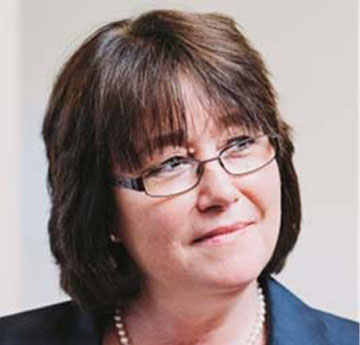Professor Diane E. Kelly FHEA FRSB FLSW
Swansea University, Institute of Life Science - Medical School
Microbiology & Biotechnology
Swansea University, Institute of Life Science - Medical School
Microbiology & Biotechnology
It was a convoluted pathway when I look back, hardly linear at all despite the diagram and scientifically speaking started with my BSc, followed by a PhD in Swansea, via research positions in Sheffield University and Aberystwyth University and then full circle to Professor in Swansea….not predicted or planned, but definitely a feeling of being “put”. What remained constant throughout was working with the yeast Saccharomyces cerevisiae and a sustained interest and excitement in the enzyme superfamily Cytochromes P450.
Three women in particular, my Rector’s wife who was a Biology teacher and once gave a talk on the compatibility of evolution and the Christian faith.

My “O”- level Biology teacher, Miss Wells and my headmistress who studied Physics at University and was the only woman on her course. What strikes me now is that none of them actually became STEM researchers, but each was an enthusiast for science and that struck a chord in me.
It was a particular course during my degree that actually sparked my interest in metabolism and a textbook by D C Parkes, reading it “made the penny drop”. Two men in particular have provided support at key times in my life, Dr Maurice Coombs of Imperial Cancer Research Fund (now CRUK) who supported my application and studies for a PhD and at the risk of sounding sentimental, my husband Professor Steven Kelly with whom I have shared a lifetimes work in the P450 field.
I think this has to be the ever expanding number of Cytochromes P450 that are being discovered through the use of Bioinformatics, specifically looking at protein sequences, comparing them with other proteins and the realisation that the diversity among this superfamily is beyond anything we could ever have imagined. My original undergraduate Biochemistry textbook hardly made mention of them and now we know there are thousands of these proteins…..all related to one another and with a diversity of activities that can be harnessed in biotechnological processes, or used as targets to combat infection.
Inflated egos and esteem factors. Science is for the most part built on team-work, but the culture today pays too much attention to “me, myself and I”. This is probably the same in other disciplines/professions, but is a sad reflection on our current “selfie” obsessed society.
I love reading, I always have several books on the go at once and at the moment I am reading a lot by C.H. Spurgeon, Dr D. Martyn Llloyd-Jones, the history of revival in the church and the reformation (Calvin). These books have sparked a lot of discussion with church friends and family during this challenging period in our history. Recently I finally finished reading Colleen McCullough’s series on Rome and Caesar, it took me years because of all the other books I had on the go!
I wish I could say that I knit, sew and cook, but while I am capable of all three the standard has not been stellar, except perhaps my lasagne and gratin dauphenois dishes! Recently I managed to sew a cushion cover and was so pleased with it that I immediately sent a photo to the whole family.
I enjoy circular walks preferably not too hilly, which is a challenge in mid –Wales, but still possible and has been an unanticipated positive experience during the lock down period.